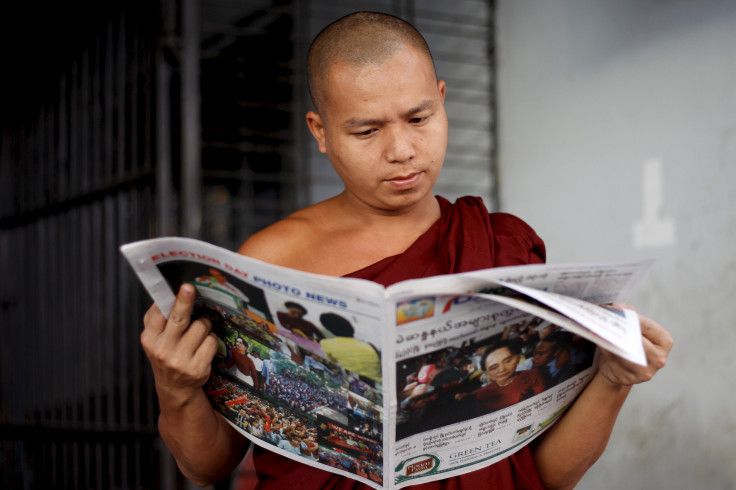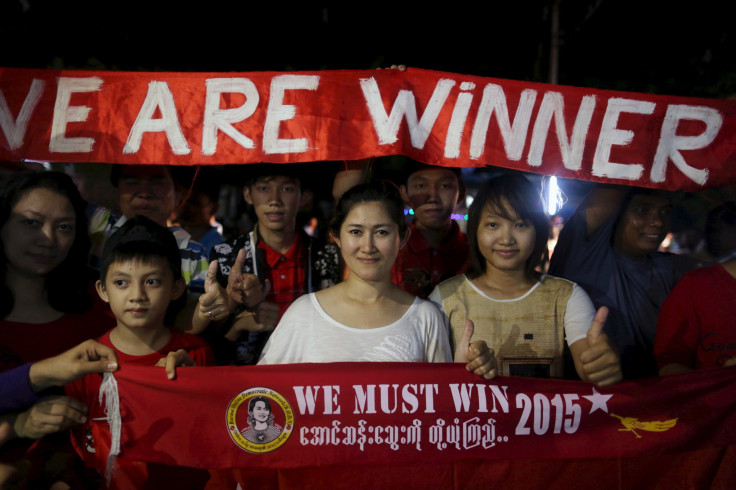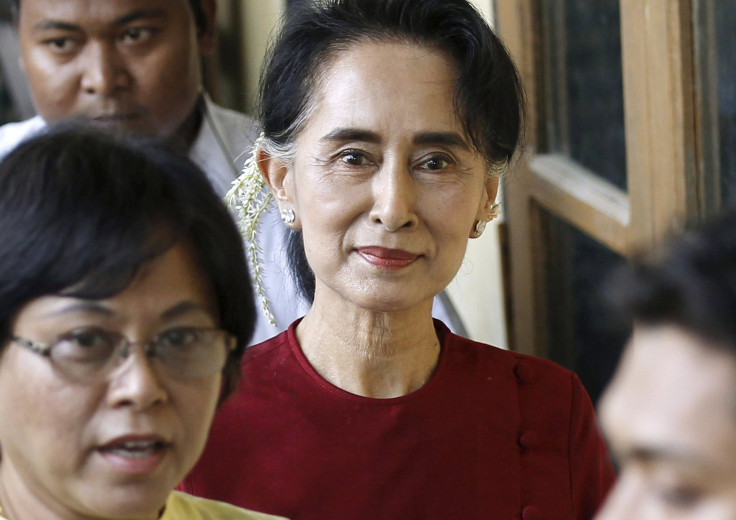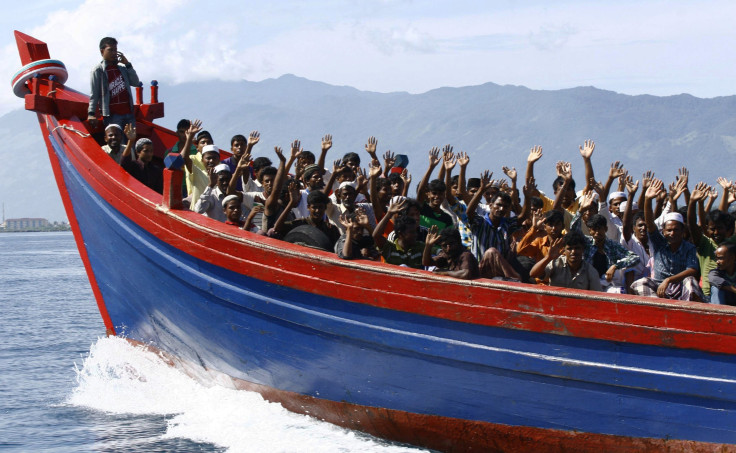Dreams Of Democracy: Aung San Suu Kyi Supporters Are All Smiles On Myanmar's Historic Election Day

UPDATE: 6:55 p.m. EST -- U.S. Secretary of State John Kerry issued a statement Sunday night about the elections in Myanmar.
"The United States congratulates the people of Burma on the November 8 election and commends all of the people and institutions in the country who worked together to hold a peaceful and historic poll," Kerry said in his statement, using the historic name of the country. "Millions of people from around the country, many of whom were voting for the first time, seized this opportunity to move one step closer to a democracy that respects the rights of all -- a testament to the courage and sacrifice shown by the people of Burma over many decades."
Kerry added: "While these elections were an important step forward, we recognize that they were far from perfect. There remain important structural and systemic impediments to the realization of full democratic and civilian government, including the reservation of a large number of unelected seats for the military; the disfranchisement of groups of people who voted in previous elections, including the Rohingya; and the disqualification of candidates based on arbitrary application of citizenship and residency requirements.
"The United States, along with the domestic and international observers, has closely monitored the electoral process. We will continue to watch the vote counting process, and encourage all parties to help ensure the tabulation is transparent and credible and any complaints are addressed promptly, transparently, and appropriately."
He added, "Today’s election has the potential to be an important step towards greater peace, prosperity, and democracy for the people of Burma."
Original story:
YANGON, Myanmar -- Thousands of people rallied outside the headquarters of Myanmar’s biggest pro-democracy party Sunday night, after the country saw its first general elections since emerging from nearly half a century of brutal military dictatorship. Hours earlier, at more than 40,000 polling stations across Myanmar -- in Buddhist temples, schools, and government buildings -- voters had lined up in the predawn hours, with some arriving as early as 3:30 a.m. local time, waiting for the process to begin.
“When I vote for the NLD [National League for Democracy] today, I hope everything will change. I voted for the USDP [Union Solidarity and Development Party] in 2010, but nothing has changed since then,” Thae Su, 24, a marketing professional in Yangon, told International Business Times.
Official results may not be known for days, but that did not stop supporters flooding the street outside the NLD’s headquarters in Yangon, Myanmar’s commercial capital, after polling stations closed. A giant television screen showed the early counting of ballots, and the crowd, including monks and children hoisted on the shoulders of parents, cheered at tallies in favor of their party. Some waved large party flags, chanting in Burmese, “The NLD must win!”
Candidates of more than 90 parties are competing for seats in the country’s national parliament and regional assemblies, but the main showdown is between the NLD, led by Nobel Peace Prize laureate Aung San Suu Kyi, and the ruling, military-backed USDP, the party of President Thein Sein and former junta leaders.
“We hope for the best; we’re prepared for the worst,” Suu Kyi told reporters at her lakeside residence in Yangon Thursday, three days before the vote. If the elections are fair, her party expects to see major gains in parliament, which will select the next president in 2016.
“We won’t be able to announce the result yet. All I can say is that the NLD is in a very good position,” Tin Oo, a co-founder of the party, told the crowd of supporters outside NLD headquarters Sunday night, according to the Associated Press.

“I’m so happy I can’t even explain my feeling. The country will be changed,” said 28-year-old Kyaw Zaya, smiling and holding up his pinky finger with a purple ink stain to indicate that he had cast his ballot earlier in the day.
While flawed, the elections are expected to constitute Myanmar’s most credible vote in decades, with thousands of local and international election observers deployed across the country. They stand in sharp relief to the nation’s last general elections, in 2010, which were rigged in favor of the junta and boycotted by the NLD. In the elections before that, in 1990, the NLD won by a landslide, but the results were annulled by the regime and candidates from the opposition party were thrown in prison.
The U.S. and others in the West are viewing these elections as a litmus test for the democratic reforms introduced by Myanmar’s quasicivilian government, which came to power four years ago and is led by many former generals in the previous military regime. U.S. President Barack Obama’s administration has reportedly spent $18 million to fund Myanmar’s election process in an effort to support democracy in the country.
The results could affect U.S. policy in Myanmar and Southeast Asia -- Myanmar sits strategically between India and China, and its transition from dictatorship toward a more democratic system would be a win for Obama’s pivot to Asia, helping to counterbalance China’s influence in the region.
The extent to which these elections are fair and their outcome respected will affect the credibility of Myanmar President Thein Sein, who has improved relations with the West after decades of political repression and civil war under the military regime. After taking office in 2011, Thein Sein, a former general and prime minister for the junta, rolled out a number of reforms. His administration released political prisoners, eased media censorship, signed ceasefire deals with armed rebel groups and courted foreign investment in a country long closed off from the international community.

The U.S. and Europe responded by re-engaging diplomatically with Myanmar and easing economic sanctions that had been imposed on the military regime for human-rights abuses in the 1990s. But the country still has a way to go before it can be called a democracy. In the last two years, its reforms have stalled, civil wars between the military and armed rebel groups have continued, and more political activists and journalists have been imprisoned. The government has also failed to protect a stateless Muslim minority group known as the Rohingya, who have been driven from their homes by violent Buddhist mobs in western Myanmar.
The Obama administration has said it will evaluate conduct around the elections while deciding whether to fully normalize relations with Myanmar’s government, including the lifting of the remaining economic sanctions. It has called for a “credible, transparent and inclusive” voting process, but Ben Rhodes, a U.S. deputy national security adviser and Obama confidant, acknowledged this week that “systematic problems” within Myanmar’s political system meant that the vote could not be viewed as “completely free and fair.”
Among those systematic problems is a clause in Myanmar’s constitution that reserves one-quarter of the 664 seats in parliament for unelected military representatives, who have veto power over constitutional amendments. Drafted by the junta, the constitution also bars Suu Kyi -- the country’s most popular politician -- from the presidency because she has two sons with foreign citizenship. If her party wins enough seats, she has said she will lead the country anyway, in a position “above the president.”
Suu Kyi’s party has campaigned with the slogan “Time for Change,” describing the current government’s reform process as superficial. “We have to change the education system, the health system. Most importantly, we have to change the military system to a democratic system,” Aung Thein, an 82-year-old member of the NLD’s campaign committee told IBT, adding that he was imprisoned twice by the junta for his political activism.
Despite her public support, Suu Kyi has reason to be concerned about the fairness of the vote. Her party has cited problems in the run-up to the elections, including major errors in voting lists and irregularities in early-voting activities. An estimated 4 million people, or more than one-tenth of the eligible voting population, were not able to cast ballots, either because they lacked information to register or lived in areas where they were not able to do so. Hundreds of thousands of Rohingya Muslims were disenfranchised by the government because they are not considered citizens, while people living in areas of civil war were blocked from voting because of safety concerns.
Meanwhile, an election official was quoted by Agence France-Presse as saying that 80 percent of those eligible to vote turned out to cast ballots.

Security was stepped up across Myanmar, and about 10,000 local election observers were deployed to monitor the vote, along with hundreds of international observers from the Carter Center, the European Union and foreign embassies. “From a transparency standpoint, that is a major step forward,” Jason Carter, the grandson of former U.S. President Jimmy Carter, told reporters in Yangon. Election officials in the city said voting proceeded smoothly, although political candidates and residents elsewhere in the country complained that many voters showed up at polling stations only to find that their names had been struck from the lists of voters.
At a rally for the USDP in Yangon Friday, a leading party member told supporters that he had no doubt his party would succeed at the polls. “We will no longer use the phrase, ‘We will win.’ Let me tell you in advance that we have won,” Nada Kyaw Zwa, a member of the party’s central executive committee, told the crowd.
The rally attracted several thousand people, many of whom were low-level civil servants who had been given the day off to show up in green attire -- the USDP’s color -- and dance to pro-government songs. “I don’t like Aung San Suu Kyi because she’s friends with foreigners,” USDP supporter Naing Win told IBT.
Last month, Myanmar’s president said the country had seen enough political change. “We have changed a military regime to a democratic government elected by the people,” Thein Sein told supporters, according to local media. “What more change do you want? If you want more, go for communism. Nobody wants communism, do they?”
Friday, however, the president pledged to honor the results of the vote. “Our government and the military want to repeat that we will respect the outcomes of the free and fair election,” he said in a speech broadcast on national television.

To overcome the reserved military bloc in parliament and to select a president, the NLD needs to take more than two-thirds of contested seats. If it fails to do so, it may still be able to choose the next president by forming an alliance with smaller pro-democracy parties and ethnic parties.
During 2012 by-elections, the NLD demonstrated its sweeping popularity by claiming 43 of the 44 parliamentary seats it contested, but members of the NLD are cautiously optimistic, saying that regardless of the elections’ outcome, the party will likely need to compromise with the USDP. “Burma will get democracy,” the NLD campaign committee’s Aung Thein said, using another name for Myanmar. “But we will have to work for many years.”
Speaking to reporters Thursday, Suu Kyi appeared confident in her party’s chances to achieve democratic change. Asked about the reserved bloc of military seats in parliament, she said, “I don’t believe there are such things as unbreakable blocks, especially human ones.”
© Copyright IBTimes 2024. All rights reserved.





















